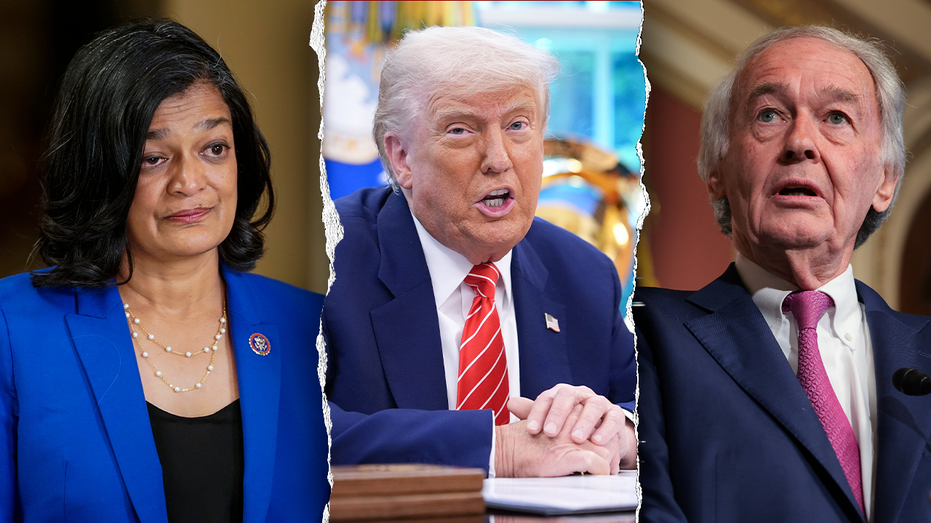Critics Rage Over Trump's Renewed 'Muslim Ban' as Travel Restrictions Spark Controversy
Democrat lawmakers and critics slam Trump's travel ban as 'bigoted' and 'Islamophobic.'

Democratic lawmakers and social media critics are raising strong objections following President Donald Trump's announcement of a sweeping new travel ban, labeling the policy as "bigoted" and accusing the administration of fueling "Islamophobia." The measure, unveiled in a proclamation on Wednesday, restricts travel to the United States from a total of 19 countries, including several with predominantly Muslim populations.
Rep. Pramila Jayapal (D-WA) was among the first to voice her opposition, criticizing the ban on social media just hours after its release. "This discriminatory policy, which limits legal immigration, not only flies in the face of what our country is supposed to stand for, it will be harmful to our economy and communities that rely on the contributions of people who come to America from this wide range of countries," Jayapal stated. She warned that targeting entire populations based on their countries' governments "creates a dangerous precedent."
Under the new proclamation, travel restrictions now apply to citizens from twelve countries deemed "very high risk" due to concerns over terrorism, unstable or hostile governments, and high rates of visa overstays. Notable among these are Afghanistan, Iran, Somalia, Libya, and Yemen. An additional seven countries, including Venezuela, Cuba, and Laos, face partial restrictions intended to limit the entry of certain categories of travelers.
President Trump defended the decision in a video message posted to social media, citing the recent terror attack in Boulder, Colorado, as an example of the dangers posed by inadequately vetted foreign nationals. "We don't want them," Trump said, referencing individuals entering the U.S. without thorough screening or those overstaying visas. He continued, "Thanks to Biden’s open-door policies, today there are millions and millions of these illegals who should not be in our country."
Tensions escalated following the arrest of Mohamed Sabry Soliman, an Egyptian national charged with a hate crime and attempted murder after allegedly attacking a pro-Israel group in Boulder. Authorities said Soliman was living in the United States illegally after his visa expired, fueling further debate over the vetting process and the necessity of broad travel bans.
The announcement triggered swift backlash from across the political spectrum and various advocacy groups. Rep. Judy Chu (D-CA) condemned the move as "disgusting, bigoted, and Islamophobic," arguing it undermines American values while failing to enhance national security. Critics labeled the policy as racially and religiously discriminatory, with Rep. Yassamin Ansari (D-AZ) calling it "cruel, racist, and un-American."
The Council on American-Islamic Relations (CAIR), the largest Muslim civil rights organization in the country, released a statement denouncing the bans. Executive Director Nihad Awad remarked, "Automatically banning students, workers, tourists, and other citizens of these targeted nations from coming to the United States will not make our nation safer." CAIR warned that such measures risk stigmatizing entire communities based on their religious identity or political beliefs.
Senator Ed Markey (D-MA) joined the chorus of opposition, posting, "Make no mistake: Trump’s latest travel ban will NOT make America safer." Meanwhile, Rep. Don Beyer (D-VA) argued the policy "betrayed the ideals and values" upon which the nation was founded, contending that "Trump’s use of prejudice and bigotry to bar people from entering the U.S. does not make us safer, it just divides us and weakens our global leadership."
Humanitarian organizations also weighed in. Abby Maxman, CEO of Oxfam America, called the ban "an executive order [that] deepens inequality and perpetuates harmful stereotypes, racist tropes, and religious intolerance." Maxman asserted the move is not about security, but about "sowing division and vilifying communities seeking safety and opportunity."
The White House, in response, described the policy as a "commonsense" approach, stating it targets countries that "lack proper vetting, exhibit high visa overstay rates, or fail to share identity and threat information." A spokesperson emphasized, "President Trump is fulfilling his promise to protect Americans from dangerous foreign actors that want to come to our country and cause us harm."
This is not the first time travel restrictions have become a flashpoint in American politics. During his first term, Trump faced widespread criticism after instituting what became known as the "Muslim ban"—a move similarly justified on national security grounds but widely derided as discriminatory. While Trump and his allies insist the bans are not directed at any particular religion, advocates and lawmakers continue to argue that the policies disproportionately affect Muslim-majority and other marginalized nations.
As public debate intensifies, it remains clear that the latest travel ban has reignited fundamental questions about the balance between national security and American values of inclusion and diversity. With legal challenges and political showdowns likely ahead, the future of the administration’s restrictive immigration policy hangs in the balance.




